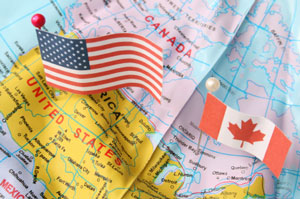
Visa and Passport
A visa is not required for U.S. citizens visiting Canada, providing their stay does not exceed 180 days. However, if you are coming into Canada for reasons other than a pleasure trip, such as to work, study, or immigrate, then you must qualify for the correct entry status. In such a case, you should contact the Canadian Embassy or a nearby consulate in order to obtain the appropriate answers to your questions, and get the necessary application forms for a temporary visa.
Americans visiting Canada for a leisure purposes must hold a valid, up-to-date U.S. passport. NEXUS card and Green Card holders can use their membership documentation as a substitute for a passport, as it proves both identity and citizenship. Like a passport, the NEXUS or Green Card is scanned at land border crossings and airports. The card costs $50.
Note: all American visitors require an Electronic Travel Authorization (eTA) if arriving by plane (an eTA is not necessary if arriving by land or sea).
Medical
Each Canadian province has its government-operated health care plan, and every Canadian citizen holds a Medicare card that gives them access to the benefits of that plan. If you are an American visiting Canada, and you require medical attention during your stay, you should be prepared to pay, in cash, the amount required for medical services, at the time that the service is performed. Canadian health care providers do not accept U.S. domestic health insurance.
It is always a good idea to purchase medical travel insurance, even if your trip is a short one. It is best to be prepared!
Firearms
In Canada, possession and use of firearms is more strictly controlled than in the United States. Since January 2001, visitors bringing firearms into Canada, or planning to borrow or use firearms while in Canada, must make a declaration in writing on the appropriate forms (in triplicate), which must be signed by a border patrol officer at the point of crossing. A temporary firearms license is valid for up to 60 days. If your firearms are not declared, they may be confiscated and will not be returned to you. Moreover, you could be arrested and face possible jail time.
It is important to remember that while traveling to another country, you are always subject to that country's laws and regulations.
Contact Information
If you are an American visiting Canada and you would like additional information on matters concerning your travels north, you can contact the Canadian Embassy in Washington:
Embassy of Canada to the United States 501 Pennsylvania Ave. NW Washington, DC 20001 Telephone (general inquiries): 202-682-1740
Canadian consulate offices can also be found in the cities of Atlanta, Boston, Chicago, Dallas, Denver, Detroit, Honolulu, Los Angeles, Miami, Minneapolis, New York, San Francisco and Seattle.
